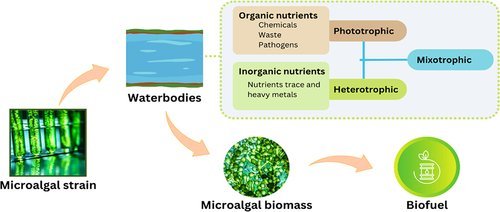
Over the last decade, significant strides have been made in the development of biofuels derived from algae, positioning them as a promising and sustainable alternative to petroleum-based energy sources.
Due to their high lipid accumulation rates and low carbon dioxide emissions, microalgal species are considered highly valuable feedstock for biofuel generation.
The journey towards harnessing the potential of microalgae for biofuel production has been marked by innovation and research, yielding remarkable results.
In a new review article published by scientists from Yuan Ze University, the University of Tarapacá, Universitas Padiadiaran, Chung Yuan Christian University, and the University of Nottingham Malaysia, the importance of biofuels and the challenges that must be addressed to ensure the effectiveness of algae-based biofuels as a future-ready bioenergy source are explored in depth.
Additionally, the article describes issues related to optimization and engineering strategies for implementing microalgae-based biofuel derivatives and their production.
The Rise of Algae-Based Biofuels
One of the primary drivers behind the growing interest in algae-based biofuels is their exceptional lipid accumulation rates and low carbon dioxide emissions.
Scientific studies have reported that microalgae have the potential to produce more energy per hectare of land than traditional crops. During the stationary growth phase, microalgal biomass can contain 20-50% of oil by dry biomass weight, generating more oil per acre than any other crop.
Microalgal species, serving as the primary source of these biofuels, have proven to be highly valuable feedstock for biofuel generation.
This unique characteristic of microalgae not only reduces greenhouse gas emissions but also provides a renewable and sustainable solution to our energy needs.
Biomass Production Strategies
To unlock the full potential of microalgae-based biofuels, optimizing and refining the engineering strategies involved in their production is imperative.
This includes enhancing cultivation processes, improving lipid extraction techniques, and maximizing overall biofuel yields. Research and development efforts are ongoing to streamline these processes and make them economically viable on a large scale.
According to the study, microalgae cultivation can be conducted autotrophically, heterotrophically, or mixotrophically. However, due to the need for large-scale production, mixotrophic cultivation has garnered more attention in recent years.
The scientific review presents an overview of each type of microalgae cultivation: autotrophic, heterotrophic, and mixotrophic.
Cultivation and Biomass Production
The scientific review article also provides a comprehensive overview of the latest findings related to the cultivation of various algae species and biomass production.
Advancements in cultivation methods, including photobioreactors and open pond systems, are explored to determine their effectiveness in scaling up microalgae-based biofuel production.
Environmental Consequences and Global Relevance
As the world grapples with environmental challenges, the importance of microalgae-based biomass as an effective biofuel cannot be overstated.
This review article includes the latest data on the environmental consequences of algae-based biofuels and their relevance to global efforts to reduce carbon emissions and combat climate change.
Challenges, Threats, and Future Possibilities
In conclusion, this review article highlights some of the significant challenges and threats facing the development and widespread adoption of algae-based biofuels.
These include the need for further research, economic viability, and competition with established energy sources. However, it is essential to recognize that the potential benefits far outweigh these challenges.
With continued research, innovation, and investment, algae-based biofuels hold the promise of becoming a vital component of a more sustainable and greener energy future.
In conclusion, algae-based biofuels have come a long way in the past decade, demonstrating their potential as a viable substitute for petroleum-based energy sources.
This review article has emphasized the importance of these biofuels, outlined the challenges that need to be addressed, and explored the strategies and technologies required for their successful development.
As we move forward, it is crucial to stay committed to advancing algae-based biofuels to realize their full potential as a sustainable and environmentally friendly energy source.
Contact
Saravanan Rajendran
Departamento de Ingeniería Mecánica
Facultad de Ingeniería, Universidad de Tarapacá
Arica, Chile
Email: saravanan3.raj@gmail.com
Reference (open access)
Thanigaivel Sundaram, Saravanan Rajendran, Lalitha Gnanasekaran, Nova Rachmadona, Jheng-Jie Jiang, Kuan Shiong Khoo & Pau Loke Show (2023) Bioengineering strategies of microalgae biomass for biofuel production: recent advancement and insight, Bioengineered, 14:1, DOI: 10.1080/21655979.2023.2252228

